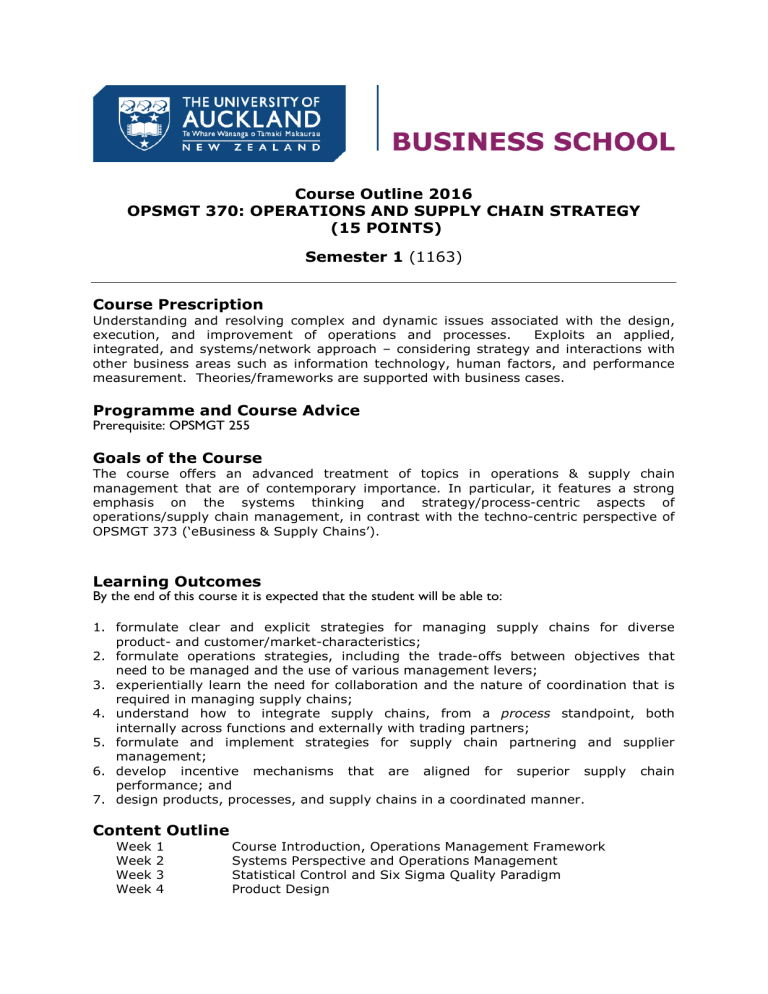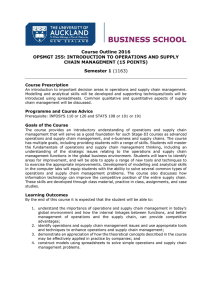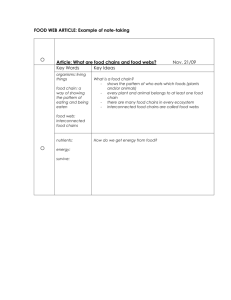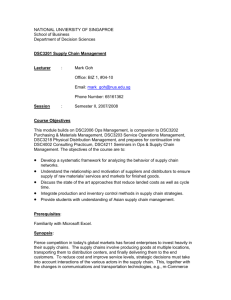Course Outline 2016 OPSMGT 370: OPERATIONS AND SUPPLY CHAIN STRATEGY (15 POINTS)

Course Outline 2016
OPSMGT 370: OPERATIONS AND SUPPLY CHAIN STRATEGY
(15 POINTS)
Semester 1 (1163)
Course Prescription
Understanding and resolving complex and dynamic issues associated with the design, execution, and improvement of operations and processes. Exploits an applied, integrated, and systems/network approach – considering strategy and interactions with other business areas such as information technology, human factors, and performance measurement. Theories/frameworks are supported with business cases.
Programme and Course Advice
Prerequisite: OPSMGT 255
Goals of the Course
The course offers an advanced treatment of topics in operations & supply chain management that are of contemporary importance. In particular, it features a strong emphasis on the systems thinking and strategy/process-centric aspects of operations/supply chain management, in contrast with the techno-centric perspective of
OPSMGT 373 (‘eBusiness & Supply Chains’).
Learning Outcomes
By the end of this course it is expected that the student will be able to:
1.
formulate clear and explicit strategies for managing supply chains for diverse product- and customer/market-characteristics;
2.
formulate operations strategies, including the trade-offs between objectives that need to be managed and the use of various management levers;
3.
experientially learn the need for collaboration and the nature of coordination that is required in managing supply chains;
4.
understand how to integrate supply chains, from a process standpoint, both internally across functions and externally with trading partners;
5.
formulate and implement strategies for supply chain partnering and supplier management;
6.
develop incentive mechanisms that are aligned for superior supply chain performance; and
7.
design products, processes, and supply chains in a coordinated manner.
Content Outline
Week 1
Week 2
Week 3
Week 4
Course Introduction, Operations Management Framework
Systems Perspective and Operations Management
Statistical Control and Six Sigma Quality Paradigm
Product Design
Week 5
Week 6
Week 7
Week 8
Week 9
Week 10
Week 11
Week 12
Week 13
Process Design
Newer Trends in Customisation
Mid-semester Test, Supply Chain Management I
Supply Chain Management II
Inventory Management I
Inventory Management II
Production Scheduling I
Project Presentations
Production Scheduling II, Exam Review
Learning and Teaching
Classes will be held at the City campus.
A variety of instructional methods will be employed, including lectures, videos, and case studies. To make the class more lively and valuable for everyone, all students are expected to have read and thought about the material assigned for each day.
The procedures and the course schedule are subject to change though all effort has been taken to plan lectures according to the schedule given. In the spirit of continuous improvement, feedback and ideas on this course are welcomed. The expectation is that students spend an average of 7-9 hours per week on the course outside of class
(approximately evenly split between reading/studying and assignments).
Teaching Staff
Associate Professor Tiru S Arthanari
Office: OGGB 453
Tel: 373-7599 (ext. 84857)
Email:
t.arthanari@auckland.ac.nz
Course Coordinator and Teaching Assistants:
Violette Wen & Hadwyn Chen
Office: OGGB 416
Email:
violette.wen@auckland.ac.nz
Learning Resources
The recommended text book for this course is Russell & Taylor, Operations
Management – Creating Value along the Supply Chain, John Wiley & Sons. There is no Course book provided. However, lecture related materials and other reading articles will be available through CANVAS or handouts given in class when required.
Assessment
Individual assignment 1
Individual assignment 2
Group project
Mid semester test
Final exam
Total
7.5%
7.5%
15%
20%
50%
100%
Each student will undertake two individual assignments and a group project. Electronic copies of assignments will be submitted by the student as per the instructions given.
Late assignments will receive a 5% penalty per (part or full) day late. Please note the material in the Undergraduate Handbook regarding Cheating and Plagiarism.
A 50-minute mid-semester test (worth 20% of the course grade) will be held during class. Time and venue will be as in the course schedule.
The projects will be presented by the groups in Week 12 in class. Guidelines for doing
Group Project will be made available on CECIL. All students are expected to be in class during the presentations and participate.
A 3-hour closed-book Final Examination (worth 50% of the course grade) will be conducted during exam week (date and time TBA). The exam will emphasise an integration of the concepts discussed in the course.
Note: Examinable material may include course notes and readings (including case studies) and class discussion.
To gain a pass for this course, students are required to achieve 50% or greater in the course.
3
4
5
6
7
Learning
Outcome
1
2
Assignment 1
X
X
Assignment 2 Group project
X
X
X
X
X
X
X
X
X
X
X
X
Test
X
X
X
Final
Exam
X
X
X
X
X
X x
Inclusive Learning
Students are urged to discuss privately any impairment-related requirements face- toface and/or in written form with the course convenor/lecturer and/or tutor.
Student Feedback
In this course student feedbacks are routinely used to change the design and delivery of the course. Students are also encouraged to know their learning styles and to use that knowledge to help the lecturer arrived at the right mix of the course delivery and class assessment methods. Student expectations are surveyed at the beginning of the course to shape the course delivery and emphasis. Student evaluations are a source of inspiration for continuously improving the course and be relevant to the stakeholders’ expectations.




